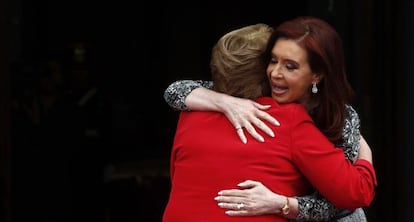Chile and Argentina strengthen relations as President Bachelet returns
Reelected Chilean leader gets back to business with Fernández de Kirchner on first official trip Two countries relaunch programs suspended under Piñera administration


Michelle Bachelet chose Argentina as the destination for her first official presidential trip abroad this week. The visit confirmed the new Chilean president’s intention to turn her country into a physical, political and economic bridge between the Pacific Alliance – of which it is a member alongside Mexico, Colombia and Peru – and Mercosur, where Argentina, Brazil, Paraguay, Uruguay and Venezuela collaborate. Together Bachelet and Argentinean President Cristina Fernández de Kirchner announced their commitment to add 5,300 kilometers of connecting passes in the Andes where they share the world’s third longest border between two countries. The two leaders held a press conference at the presidential palace, Casa Rosada, after their meeting on Monday to talk about their joint initiatives.
Fernández said that with Bachelet as president they would be able to make progress on issues that the previous conservative administration of Sebastián Piñera (2010-2014) had put on the back burner. “I think Piñera had other priorities, other initiatives and it was his prerogative to have them,” Fernández reflected. “I always had a good relationship with him,” added the Peronist leader who was one of the founding members of the Pacific Alliance in 2012.
I think Piñera had other priorities and it was his prerogative to have them” President Fernández de Kirchner
The two main projects along the border are an expansion of the Cristo Redentor pass, the tunnel highway that joins Santiago de Chile and Mendoza in Argentina, and the construction of the Aconcagua ocean-to-ocean railroad corridor that has been delayed for a decade. “The first thing we discussed with Michelle was her proposal to double the number of passes between Chile and Argentina,” Fernández said. “It is vital for trade with Asia, the most dynamic part of the world. Right now we have to travel a long way from Argentina to export to Asia via the Atlantic Ocean and that decreases our competitiveness.”
Both leaders said they had not discussed the conflict that followed the Argentinean government’s decision to oust the Chilean airline company, LAN, from a hangar last year. Former President Piñera had been a shareholder in LAN before taking office. The company appealed Argentina’s decision in a Buenos Aires court and the judge issued a temporary suspension of the order. “There were no claims because there is nothing left to discuss,” Fernández began. “The one who always asked me about it was Piñera. I think there’s still a court case open.”
Bachelet added: “I did not receive any petitions from LAN and that is because it is a matter for the courts to decide.”
Fernández also talked about the binational mining project the Canadian company Barrik Gold began in the Andean glaciers. Chile suspended the work due to environmental concerns and related claims in court. “Mining is not the only activity that pollutes,” Fernández said. “Mining itself is neither good nor bad. The Argentinean president favors establishing oversight measures as the government does for other sectors.
“We are very happy to see you back as president of our sister Republic of Chile,” Fernández told Bachelet. The two women served their respective countries together between 2007 and 2010. “We think our two countries have many pending issues left to solve together,” she added in a slight jab at Piñera. Bachelet thanked her for being the first head of state to call when the mine collapsed in northern Chile, during the Valparaiso wildfires, and for sending help on both occasions.
Translation: Dyane Jean François
Tu suscripción se está usando en otro dispositivo
¿Quieres añadir otro usuario a tu suscripción?
Si continúas leyendo en este dispositivo, no se podrá leer en el otro.
FlechaTu suscripción se está usando en otro dispositivo y solo puedes acceder a EL PAÍS desde un dispositivo a la vez.
Si quieres compartir tu cuenta, cambia tu suscripción a la modalidad Premium, así podrás añadir otro usuario. Cada uno accederá con su propia cuenta de email, lo que os permitirá personalizar vuestra experiencia en EL PAÍS.
¿Tienes una suscripción de empresa? Accede aquí para contratar más cuentas.
En el caso de no saber quién está usando tu cuenta, te recomendamos cambiar tu contraseña aquí.
Si decides continuar compartiendo tu cuenta, este mensaje se mostrará en tu dispositivo y en el de la otra persona que está usando tu cuenta de forma indefinida, afectando a tu experiencia de lectura. Puedes consultar aquí los términos y condiciones de la suscripción digital.








































